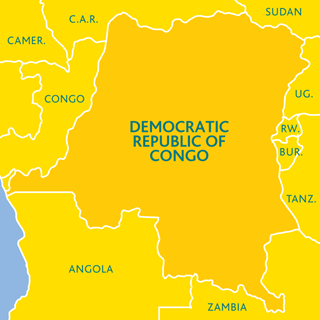Congo seeks investors for farmland bigger than France

The Democratic Republic of Congo plans to lease farmland covering an area larger than France in an attempt to attract capital and technology capable of boosting jobs and food productivity in one of the world’s poorest countries.
Congo may lease as much as 640,000 square kilometers, or more than a quarter of the central African nation, according to John Ulimwengu, an adviser to the Congolese prime minister who is organizing the project. The land is scattered across Congo, which is rich in mineral resources, forests, cultivable soil and water, including the Congo River, Africa’s second-longest after the Nile. The government wants investors to transform the country’s subsistence-farming.
The farmland will be leased rather than sold outright in a bid to avoid future conflicts with investors who might be accused of land-grabbing. Memories of colonial injustice abound on the African continent. Investors from China to the United Arab Emirates and Western nations are buying African land as they search for yield and productive assets. Clashes over land have occurred in Zimbabwe, where President Robert Mugabe seized farms from white settlers.
“We don’t want what happened in Zimbabwe happening in DRC—land conflict,” said Mr. Ulimwengu, who is also a senior researcher at the Washington-based International Food Policy Research Institute. “We want to make sure that we are doing it properly.”
Africom Commodities (Pty) Ltd., a closely held South African company, is developing the first of Congo’s agribusiness parks at Bukanga-Lonzo in partnership with the Congolese government. Africom has already planted 2,200 hectares of maize, and a total of 10,000 hectares will be planted by the end of January, according to Tania Grobler a spokeswoman for the company.
Converting African land into large farms is “a hugely sensitive issue” because investors can encounter conflicting claims to ownership and usage from locals, said Andrew Brown, chief investment officer of Emerging Capital Partners, a private-equity firm that invests in Africa. “If you get into clearing previously unused land you have to pick your way very carefully through the ownership rights and land rights,” Mr. Brown said in an interview.
Badly devised projects can harm or displace local people, who may then find ways to ensure the projects fail, said Jennifer Duncan, the Africa program director at Landesa, a Seattle-based nonprofit that works to secure land rights for the world’s poorest farmers. Congo ranks second-last on the United Nations’ Human Development Index, a measure of human development indicators such as living a long and healthy life, being knowledgeable and achieving a decent standard of living.
“I have yet to see an agricultural investment in Africa that I am convinced will be to the net benefit of the communities that were using the land before,” Ms. Duncan said. “Respecting land rights so that investments are sustainable is essential to effective risk management and long term financial success.”
Congo’s plan to lease land to investors was developed after an earlier initiative to support small-scale farmers failed. A government project to provide seeds and equipment such as new hoes and machetes wasn’t sustainable because it depended on limited public funds, Mr. Ulimwengu said. The farmers also didn’t have the capacity to store, process and transport their produce to market.
The government plans to initially develop 21 agribusiness parks that will provide food, employment and a market for the produce of nearby small-scale farmers, Mr. Ulimwengu said. Infrastructure including power, water and roads will be provided by the government, which plans to sell 25-year leases to the land. The leases may be longer if new legislation is passed.
By SIMON CLARK
Source: WSJ

